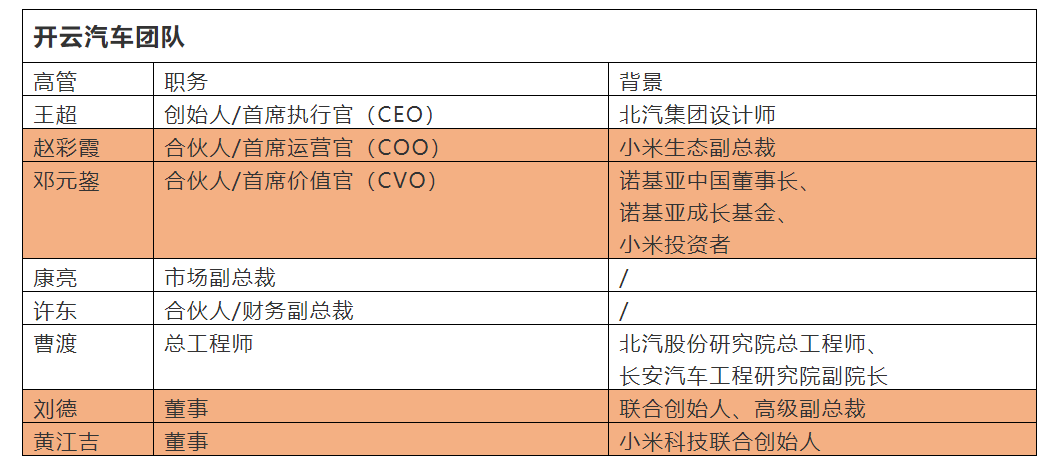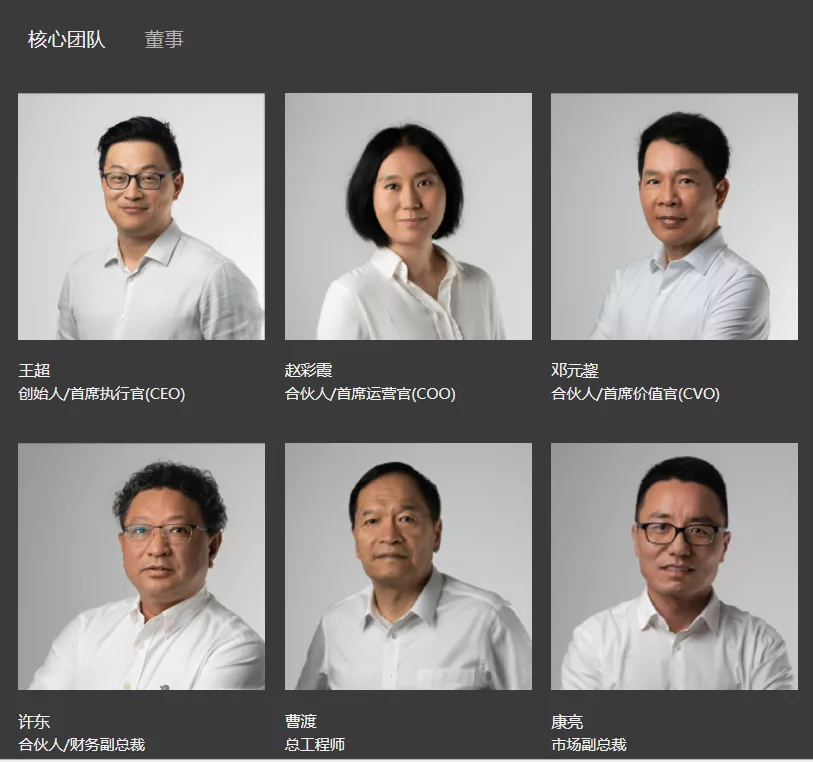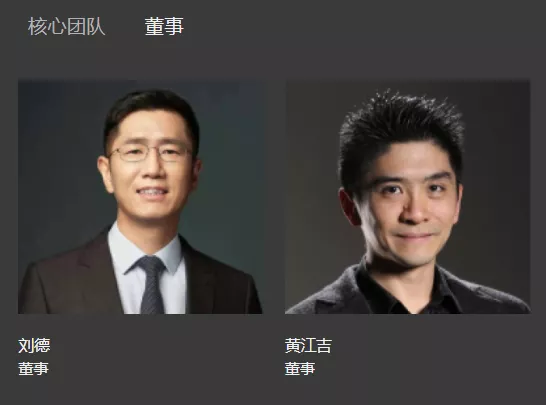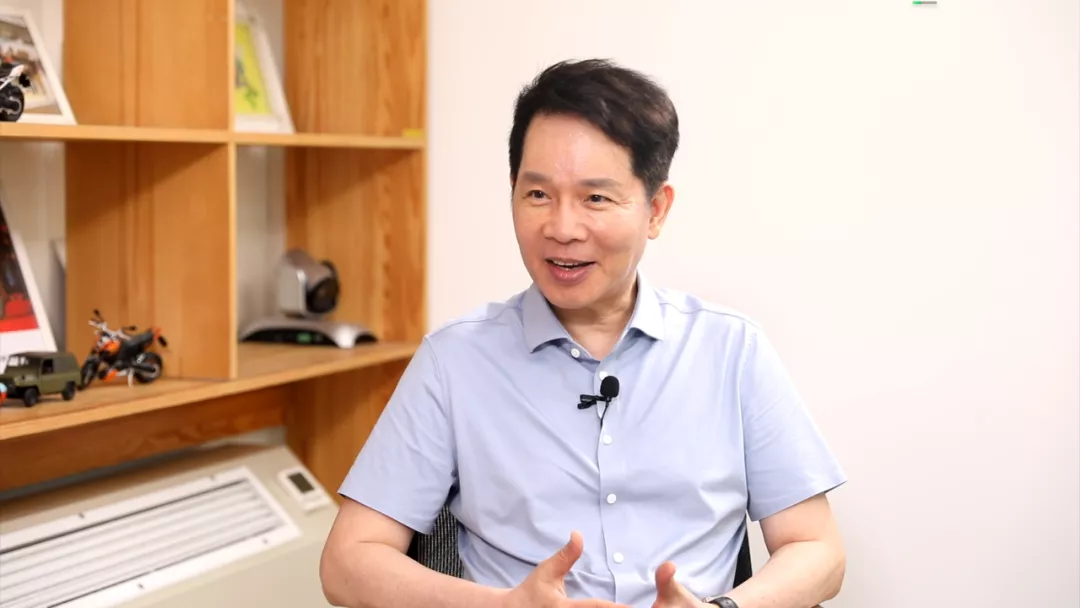Author: Qiu Kaijun
“Currently, we are in the second phase of the encirclement of cities by rural areas, which means returning to the cities,” said Wang Chao. “We call this stage Xin Kaiyun.”
Through some media reports, we suddenly discovered that Kaiyun Auto, founded by designer Wang Chao, has launched a new strategy. It has switched from being a producer of county and township electric pickups to becoming a provider of digital logistics for last-mile delivery, attempting to disrupt the traditional three-wheeled delivery vehicles.
Wang Chao believes that his original intention has not changed. “We are doing the same thing, but the scenario has changed from rural to urban.”
So, what exactly is Kaiyun doing?
All of their business vehicles are driven by efficiency. However, previously, they produced electric pickups, while now they have created a new, specialized vehicle for last-mile logistics in the city – a long, thin electric vehicle that can carry only one person, with roughly the same width and flexibility as a three-wheeler, and a similar-sized cargo space. However, this “new species” is equipped with an Internet of Things (IoT) system, which realizes efficient scheduling through digitizing and cloudizing people, vehicles, and goods. This has also led to the development of customized last-mile delivery services.
There are millions of three-wheeled delivery vehicles in China. Kaiyun’s goal is to eliminate them all and turn them into digital carriers.
On August 20th, the Electric Vehicle Observer and Cyber Auto jointly interviewed Kaiyun Auto CEO Wang Chao and the newly joined CVO (Chief Value Officer) Deng Yuanjun.
Wang Chao revealed that their digital last-mile delivery vehicles have undergone small-scale testing and they hope to achieve “urban-level” promotion and application by the end of this year.
In 5-10 years, Kaiyun Auto’s vision is to become “a world-class provider of digital logistics.”
Solving More Than Just “Itch Points,” We Must Address “Pain Points”
Kaiyun Auto is named in memory of Wang Chao’s father, Kaiyun.
Wang Kaiyun was once a soldier in the automotive industry, and after retiring, he returned to Qingdao, Shandong. Wang Chao’s original intention in building cars was to create a sturdy and durable agricultural vehicle for rural people like his father.
On May 20, 2016, Kaiyun Auto launched its first car, PICKMAN, priced at 23,800 yuan, which was a breakthrough for car building in rural China.
However, during 2016-2018, Kaiyun Auto delivered only about 5,000 electric pickups. This is not a significant figure in the field of low-speed electric vehicles.
Afterward, Wang Chao shifted his focus to county-level entrepreneurs. “We found that in order to make farmers prosperous, we must pay attention to the next upstream layer, which is the county-level entrepreneurs.”But this strategy shift is still not working well enough. “In China’s rural areas, electric pickups solve a lot of itchy problems,” Wang Chao said. “The three-wheeled vehicles replaced by electric pickups, whether electric or oil-powered, are not considered necessary upgrades or essential needs by users.”
Wang Chao believes that reaching only “itchy points” instead of solving “pain points” is unsustainable for a product-driven or technology-driven company.
Wang Chao wants to find a new direction, but he has to follow his own path. “We have proven that we can provide functional and efficient products based on different scenarios. My team is good at doing this.”
“If it’s efficiency-driven commercial vehicles, which group needs it?”
The sudden outbreak of the COVID-19 pandemic gave Wang Chao inspiration. “During the pandemic, the pause button was pressed in the big cities. Those flows that everyone thought were necessary, including the flow of people, suddenly paused.” Wang Chao said, “However, last-mile logistics cannot stop.”
With a deeper understanding of this market, Wang Chao confirmed that the urban end-to-end logistics scene urgently needs compliance and digital upgrades, especially in recent times where he feels the need is getting stronger.
Firstly, there is a huge demand for this scene, which is growing rapidly. He quoted statistics that the national express delivery volume in 2020, not including take-out, exceeded 830 billion, which meant over 1.6 trillion deliveries. This year, the expected volume is 120 billion to 130 billion, but the number of express delivery personnel cannot continue to grow. Moreover, now the government and society are concerned about the rights of delivery personnel and the impact of delivery vehicles on traffic. It is no longer possible to continue to squeeze their efficiency.
Secondly, the transportation tools in this scene, “whether it’s two-wheeled or three-wheeled, or four-wheeled microvan, etc., are not designed for the current commercial scene.”
Thirdly, delivery personnel need career prospects. Today’s express delivery personnel are all young and strong because of their strong workload. But what if they can’t do it in two years? Also, “from a national perspective, the youngest and most educated group of young people, numbering in the tens of millions, are doing a job with no value. How can this country have a future?”
“If you go to Japan, all the taxi drivers are white-haired and drive very steadily. Because its entire process has been standardized, the service is super good, it is not a test of physical strength, but a test of hardware, system and service. This also supports drivers to treat it as a profession.” Wang Chao said.”Currently, in the words of Wang Chao, if you go to find a girlfriend or wife, and their future mother-in-law asks, you will be seen as a delivery or takeout person, and that is not acceptable. However, if the nature of deliverymen changes due to hardware, system, and service, they become professionals who work with high-tech tools in an office, then how is it different from someone working with computers?
Wang Chao believes that the end delivery should be transformed into digital transport and upgraded into urban digital infrastructure. The profession and its development will be redefined, and even production relations will be redefined.
At present, the world is pursuing high logistic efficiency with the Chinese market being the core market of this endeavor, and it has reached top-level efficiency in logistics. However, no one has successfully resolved the fundamental and painful issue of digital logistics.
Therefore, at the end of 2019, Wang Chao began to reorient the strategic direction towards the urban end logistics scenario. On the one hand, he began to understand the market by using a subsidiary company named Yunzhaipei during the end delivery process, while on the other hand, he began to build teams for systems and services.
A New Species Defined by the Scenario
As a designer, Wang Chao was the first generation product designer of Mobike.
He concludes that Mobike and OFO, two early shared bike companies, differ mainly in that Mobike considers it a new format while OFO is just renting bicycles. Of course, he appreciates Mobike’s approach: ‘To solve this new format fundamentally, it must be solved through hardware updates. Without hardware renewal, just using a set of systems cannot make a significant difference.’
For many e-commerce and logistics companies, they have attempted to overturn the traditional three-wheeled delivery vehicles, however, Wang Chao believes that the existing hardware solutions have not truly started from the scenario. “If everyone started with the improvement plan, then it certainly won’t work. It is a new species that hasn’t appeared before. You can only make it succeed if you have this attitude.”
“For example, hundreds of thousands of three-wheeled delivery cars have proven the ideal width, but now many organizations still hold on to the hope that a small van can deal with this issue, is that even possible?” Wang Chao said.
However, the “new species” Wang Chao wants to make “is first a car… What is the essence of a car? It must guarantee the safety of the driver and road participants. Our car is absolutely at the level of top luxury cars in terms of collision safety, and we focus on the safety of the deliveryman.”The “new species” will have very unique dimensions and performance. First, it will have a width similar to a tricycle, allowing it to go where tricycles can go. Second, it will have a cargo box, though not very large, as there won’t always be as much cargo to haul. Third, it will have a driver’s cabin providing a similar view to that of a tricycle, but with only one seat, meaning even if there’s a girlfriend, she’ll have to lean in like on a tricycle. Fourth, it will have a turning radius similar to that of a tricycle.
This “new species” will still need to meet the requirements for automobile product access. Kawaii will also find solutions for automobile production qualifications, and couriers will need a Class C driver’s license or higher.
“A driver’s license is also a protection for couriers, and can be used for insurance. You’ll know traffic rules, and it will guarantee your personal safety,” said Wang Chao. JD.com, SF Express and other companies also hope that couriers have a driver’s license.
So where does the “intelligent commercial vehicle” or “digitized logistics” come in?
Firstly, unlike passenger cars, Kawaii’s new models will not have advanced intelligent driving assistance capabilities for the time being.
Wang Chao said the vehicle will have intelligent driving assistance features, but they will follow the technology that we have all agreed upon. For example, in the driver’s cabin, driver fatigue monitoring may be strengthened.
Secondly, Kawaii’s smart commercial vehicles don’t need too many intelligent cabin features. “We believe that for couriers, smartphones have done a good job, such as entertainment and navigation.”
Thirdly, Kawaii’s intelligent commercial vehicles emphasize digitization, namely the Internet of Things (IoT) function.
“Digitization means that every one of your behaviors can be quantified and rearranged to optimize the whole process,” said Wang Chao.
Digitization is also reflected in the increase of quantifiable data and standards. For example, previously, only your location could be quantified. Now I can quantify your jolting degree, acceleration, deceleration, centrifugal force etc. When there are more quantifiable standards, the government, business, couriers and recipients will have access to more information, improving experience and efficiency.
Wang Chao didn’t provide the total number of data items the whole car could generate. His introduction was that the whole car would be a digital infrastructure, providing sufficient data. Different companies can use this to do data analysis and applications. “It’s like providing a PAD, and the industry will need to figure out what sort of perception and analysis/handling capabilities are required. For example, in the wine industry, there are algorithms and digital requirements beyond Kawaii’s knowledge. You can use Kawaii’s full digital capacity to evaluate.”
In addition, “it is IoT, and we need to be able to do OTA (over-the-air) at any time.” Not only software upgrades, but the hardware can also be upgraded. Unlike passenger cars, courier vehicles have to go back to the warehouse regularly, so upgrading the hardware can be done during those times.
“The cost of sensors will go down, and their sensing capacity will be enhanced. For example, if the LIDAR is cheaper, you can bring it back to be replaced.”## Overall, for Kaiyun, we need to invent an intelligent system and IOT digital operating system that is most suitable for end-transportation, including intelligent hardware, IOT systems, and various Internet services, which are collectively referred to as a digital application.
This digital application, compared to the previous tricycle, is similar to the replacement of a feature phone by a smartphone and is a substantial upgrade.
However, Wang Chao emphasizes that “in this significant upgrade, we require that the experience of the drivers must not have any downsides.”
Business Model: Intelligent Hardware + System + Service
Wang Chao explicitly stated that Kaiyun would promote the commercialization of smart commercial vehicles by emulating the Xiaomi model.
What is the Xiaomi model?
Wang Chao explains that Xiaomi’s electric rice cooker does not have worse cooking abilities than other home appliance brands. It may even be a little better. However, at the same time, it is also an IOT device that can be connected to various systems in the house, together with a smartphone, providing some cooking plans. It can also tell you when to start cooking, whether the cooking is done, etc. Based on these features, the price is still the same as a traditional electric rice cooker. “This is what we call the Xiaomi model.”
So, will Kaiyun sell smart commercial vehicles like Xiaomi sells smart home appliances? Or will Kaiyun provide transportation services and accept courier orders?
Wang Chao denies going straight into courier delivery. For intelligent hardware, Kaiyun will still sell it in some form.
Kaiyun Automotive Partner/Chief Operating Officer (COO) Zhao Caixia once told the media that the cost for tricycle users is several hundred yuan per month, and Kaiyun also aims to achieve this level.
Wang Chao explained that a smart commercial vehicle is undoubtedly more expensive than a tricycle. Still, a tricycle must be replaced with a new one after eighteen months, while Kaiyun’s smart commercial vehicles can be used for fifteen years.
Wang Chao said that the initial investment is high, but there are also many mature financial solutions to solve it.
As for the system and service aspects, Kaiyun Automotive still has revenue possibilities.
When the courier vehicle achieves IOT, although the cost increases, there will still be profits.
Wang Chao said that the courier fee may change. Is it reasonable to charge the same amount of money for transporting a Rolex watch and an ice cream? If you buy a 5,000 yuan bottle of red wine and want it to be delivered to your home with the top-notch service, including monitoring the bottle of wine throughout the digital process, shouldn’t you pay me more?“`
Xiaomi People, Xiaomi Model, But No Xiaomi Money
As for services, based on its Cloud Intelligent hardware and system, 开云 (Kaiyun) customizes and develops services for e-commerce and logistics enterprises. For example, if a company has obtained recognition from local governments to participate in the pilot application of unmanned logistics vehicles, 开云 can add intelligent driving functions to its own products, “which is just one of the services you can subscribe to” and can also be sold to e-commerce and logistics enterprises.
The most eye-catching aspect of 开云’s strategic adjustment this time is a series of personnel changes. Particularly, four people with close ties to Xiaomi joined 开云 as executives.

At the end of March this year, Ms. Zhao Caixia, former Vice President of Xiaomi’s Ecological Chain, became the COO of 开云 Automobile, reporting to CEO Wang Chao. In July, Deng Yuanyun joined 开云 Automobile as a partner and Chief Value Officer (CVO). Roughly at the same time, Liu De and Huang Jiangji were appointed as directors of 开云 Automobile.


Why did four high-level executives with close ties to Xiaomi join?
Wang Chao said the core reason is that “the business value and social value of this matter are enough to attract top talent.” In addition, “we feel that we can only achieve the fastest and most stable results by respecting and aspiring to the entire Xiaomi model through this approach.”
He values the Xiaomi ideology and spirits that they bring to 开云, “because it took them ten years to achieve second place in the world from nothing. I think this kind of confidence is something that any founding team would crave.”
Xiaomi is also currently building cars. Are these people joining 开云 just to pave the way for Xiaomi’s investment in 开云?
Wang Chao denies that these people’s joining is related to Xiaomi. Regarding financing, he revealed that Liu De and Huang Jiangji have already made personal investments.
As for Zhao Caixia and Deng Yuanyun entering the management team, “they are all in,” said Wang Chao, “which is a great inspiration to me.”
However, due to their close ties to Xiaomi, how about asking Xiaomi for investment?
Wang Chao believes that the influence of these people is not only limited to Xiaomi. Their joining also has strong persuasive power in the investment community. As for now, “I can only say that 开云 has enough money to use and enough talented people.”
“`Newly joined, Yuanjun Deng is an extremely experienced top management executive in the mobile, communication, and equipment industry. He has also been involved in investments for nearly 10 years in Nokia Growth Partners, with investments in well-known enterprises including Xiaomi, UC Youku, and Ganji.com.

In explaining the reasons for joining, he mentioned 4 P’s. First is People, “This team has Mr. Wang and a team with Xiaomi background, which is a very good team.”
“The second is Pain point, that is, the pain points,” Deng Yuanjun said, “the logistics system is the country’s infrastructure, and there is still a lot of room for growth in the future, but the end logistics tools are very backward, with many pain points.”
“The third P is Proof point, proof. Can the company demonstrate certain capabilities?” Yuanjun Deng said, the answer is undoubtedly yes.
The fourth P is Potential, how big is the future potential? Yuanjun Deng believes that Kaiyun is trying to do something very meaningful. “It has great influence on the national level, the social level, and the common people, individuals, families, and so on.”
Moreover, “Not only China has demands and pain points, but other countries also have pain points.” Yuanjun Deng said, “Kaiyun has the opportunity to become a great company, and a global company at that.”
This article is a translation by ChatGPT of a Chinese report from 42HOW. If you have any questions about it, please email bd@42how.com.